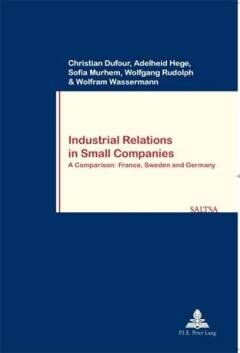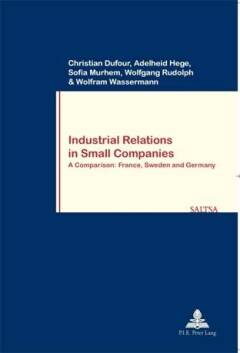
- Afhalen na 1 uur in een winkel met voorraad
- Gratis thuislevering in België vanaf € 30
- Ruim aanbod met 7 miljoen producten
- Afhalen na 1 uur in een winkel met voorraad
- Gratis thuislevering in België vanaf € 30
- Ruim aanbod met 7 miljoen producten
Zoeken
Industrial Relations in Small Companies
A Comparison: France, Sweden and Germany
Christian Dufour, Adelheid Hege, Sofia Murhem, Wolfgang Rudolph
€ 96,45
+ 192 punten
Omschrijving
Reference is often made to small companies, but little is known about them, especially regarding industrial relations. How can small companies be defined? Is their small size a sufficient feature for them to be considered the same? If they are different from each other, what makes them so? Is the distinction between them and other companies - big ones - relevant? In what way is life organised in such units, where employer and employees are in very close contact with each other? In order to answer these questions, the authors of this innovative book carried out surveys together in France, Sweden and Germany. They met employers, employees, union members and industrial relations specialists. Comparisons of these three national cases show that small companies do have common features that transcend frontiers. They do, however, also have national characteristics. They, therefore, warrant being analysed and understood in something other than merely negative terms. It thus appears that small companies are not so far off resembling big ones...
Specificaties
Betrokkenen
- Auteur(s):
- Vertaler(s):
- Uitgeverij:
Inhoud
- Aantal bladzijden:
- 234
- Taal:
- Engels
- Reeks:
- Reeksnummer:
- nr. 56
Eigenschappen
- Productcode (EAN):
- 9789052013602
- Verschijningsdatum:
- 17/12/2007
- Uitvoering:
- Paperback
- Formaat:
- Trade paperback (VS)
- Afmetingen:
- 150 mm x 220 mm
- Gewicht:
- 319 g

Alleen bij Standaard Boekhandel
+ 192 punten op je klantenkaart van Standaard Boekhandel
Beoordelingen
We publiceren alleen reviews die voldoen aan de voorwaarden voor reviews. Bekijk onze voorwaarden voor reviews.







